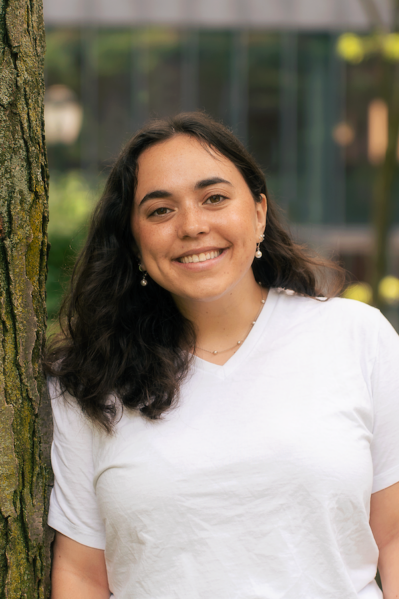Student Spotlight
Graduating Students Emma Segerman and Naomi Korn Tackle the Sports Industry

Emma Segerman, W’24, and Naomi Korn have a lot in common. Both are graduating seniors at the University of Pennsylvania – Segerman has concentrations in business analytics and legal studies & business ethics, while Korn studied philosophy, politics, and economics with a minor in statistics. Both women have a knack for numbers, and a deep love for sports. They were both involved with the Wharton Sports Analytics and Business Initiative (WSABI) as undergrads, and they both have jobs lined up in the sports industry waiting for them when they graduate. They also happen to be roommates.
The pair met on Zoom in a COVID-altered sports science class their freshman year and have since taken their own impressive journeys at Penn to find stable footing in the sports industry. Segerman’s love of sports, specifically baseball, traces back to her childhood in Ohio, where Opening Day for the Cincinnati Reds is recognized as a public holiday; her dad would take her each year. What started as a fun way to get out of going to school eventually morphed into a passion.
One year, Segerman’s softball practice interfered with Opening Day, and she wasn’t able to attend with her dad. She was devastated to such a degree that it started to dawn on her father just how much she had grown to care about the game. After that, he urged her to look into degrees in sports management.
“A lot of people would love to work in sports…you do need to be a fan at heart, but I think something that WSABI and Wharton have done especially well is showing students how to take that step from being a fan to being a professional.”
– Emma Segerman

Korn, who’s from Cherry Hill, New Jersey, and a family of lawyers, came to Penn knowing two things: she did not want to be a lawyer, and she really liked numbers. “When I came to Penn, I didn’t really know what sports analytics were like…but there was a virtual career fair, and I saw the Penn Sports Analytics Group and thought, that kind of sounds interesting,” she said. “Getting involved in the sports analytics club introduced me to the field and helped me meet the right people.”
Segerman had also joined the Penn Sports Analytics Group, a student organization which pairs analysts with sports teams at the University to provide them with high-level data analysis and matchup information. The friends Segerman made there often referenced something called the Sports Research Seminar, a seemingly mysterious and exclusive weekly discussion led by Adi Wyner, Professor of Statistics and Data Science, and Faculty Co-Director of the Wharton Sports Analytics and Business Initiative.
“The way it was described to me,” recalled Segerman, “was like this mystical, Ivy League roundtable that was invite only, and I heard that you could not join it as a freshman. I was very invested in somehow getting a mystical invite.”
Officially, the Wharton Sports Research Seminar is a non-mystical sports research group that meets once a week to discuss and collaborate on cutting-edge sports analytics research projects. With some patience and their ever-improving data science skills, Segerman and Korn did indeed secure their invitations. From there, the connections they made and the guidance they received from the group’s more senior members helped to set them on a promising track. “I think it was Zach Drapkin who convinced me that I should also get caught up on Python and SQL, so I took both of those, and that’s been super helpful,” said Segerman.
Both accepted offers to serve as Teaching Assistant (TAs) for the Wharton Moneyball Academy, a three-week sports analytics program from WSABI and Wharton Global Youth Program, designed for high school juniors and seniors held on campus each summer and instructed by Wyner. “It was definitely a learning experience,” said Korn. “I honestly didn’t know that existed, having all these high schoolers that were so interested in sports analytics. We would sit in on all the courses and the morning session lectures, so that was interesting to see.” Segerman agreed – “Learning R through TAing has been invaluable,” she said.

“The experiences and the connections I made through WSABI definitely made it so much easier. It’s such a talking point on a resumé. Just having experience – whether it be with data or teaching – it gives you everything that jobs look for.”
– Naomi Korn
Earlier that same summer Korn had already harnessed the connections she was making through WSABI to secure an internship with the Philadelphia Union. “All of June, another student, Zeke, and I commuted to the Philadelphia Union’s facility and looked at player data and did performance data analytics to help them streamline some things. It was definitely cool being at a team,” said Korn. “You would see all the players and eat at the same cafeteria as them. It was an inside look at what it would be like to work for a team with that type of schedule.”
Segerman eventually secured some impressive internships of her own – one with the Milwaukee Brewers, and another with Major League Baseball. Through her MLB internship, Segerman learned of, and was accepted to, MLB’s Take the Field Program, which offers women an opportunity to learn from current female employees in MLB through panels, conversations, and professional development opportunities. “They have these breakout tables where you can learn more about what it’s like to be a scout as a woman, what it’s like to be a coach, what it’s like to be in the operations department. It’s really just a lot of networking and learning opportunities.” Segerman was encouraged by how inclusive her time with MLB was, with women holding several key positions in the organization.

For those looking to live the dream of working in sports professionally, however, there isn’t much time to stop and reflect. “Then you get back to campus and of course everyone’s already recruiting and figuring out what they’re going to do for next summer,” Korn recalled. She knew from her time with the Union that, while working for a team definitely has its perks, her interest in data analytics was much stronger than something like player performance. That’s why when she saw that DraftKings – a sports-related company with analytics at its core – was recruiting interns, she jumped at the opportunity.
“That was a great experience,” she said of her summer in Boston with DraftKings. As it turns out, DraftKings felt the same way about Naomi as she did about them. They made her a full-time offer, which she gladly accepted. When asked why she thinks she got the offer, Korn says it was a mixture of personal and technical skills that WSABI helped her develop.
“I definitely formed relationships with my coworkers. We were able to talk, even outside of work, and I would play tennis with some of my managers. They kind of saw me as a peer. I was able to get my work done without constantly asking questions…the experiences and the connections I made through WSABI definitely made it so much easier. It’s such a talking point on a resumé. Just having experience – whether it be with data or teaching – it gives you everything that jobs look for.”
Segerman’s time interning with the MLB went similarly to Korn’s with DraftKings. Her work in international scouting left a positive impression, and she’ll be returning there full-time this summer. “My formal title is Coordinator, International Operations, so I’m working with the same team I had when I was there previously,” she said. “I feel really lucky to have that specific title. When I interned there, I thought that was my dream job…every team has really smart analytics people working for them, so where can teams really get an advantage? I think one very overlooked area of baseball is the international pipeline. I’m just really fortunate to have found a niche that I didn’t know existed, in a field that I think is really growing and ripe for development.”
As for her journey to a full-time position with MLB, Segerman credits Wharton and WSABI for helping students channel passion into action. “A lot of people would love to work in sports. But, from what I’ve seen, the people who actually make it happen are the people who see it professionally. You do need to be a fan at heart, but I think something that WSABI and Wharton have done especially well is showing students how to take that step from being a fan to being a professional.”


